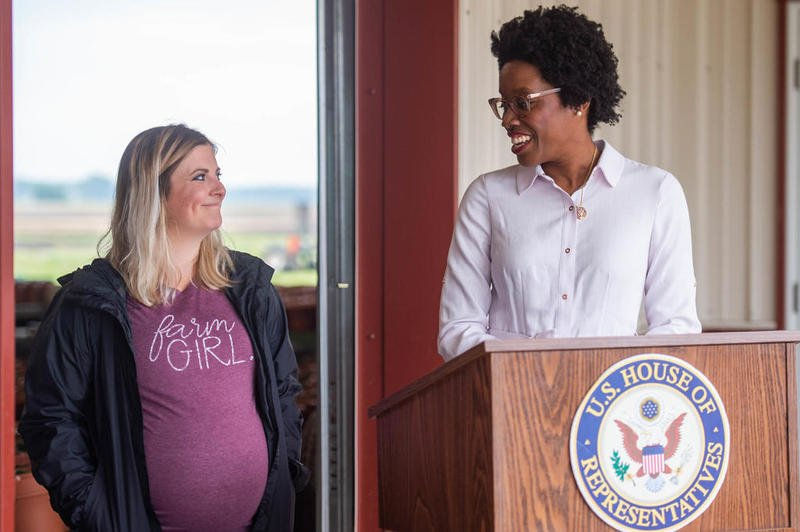Underwood speaks on health care affordability at Minooka pumpkin farm
- Megann Horstead

- Apr 6, 2020
- 2 min read
Updated: Jun 7, 2020

Minooka resident Kaylee Heap knows how burdensome it is having high health insurance premiums.
“Prior to my husband and I getting married, he was purchasing health care from the marketplace and hoping nothing went wrong,” she said. “I always worked off the farm and never had the opportunity to come back (full-time) and fulfill my dream of being able to work on the farm and grow our own business, due primarily to health care coverage.”
Heap’s story, shared at a Saturday press conference at Heap’s Giant Pumpkin Farm in Minooka, is not uncommon, said U.S. Rep. Lauren Underwood, D-Naperville.
“From day one, I heard from members of our community who struggle to pay their premiums because they’re paying full freight for their health insurance after tax dollars, forgoing enormous financial advantages the tax code affords to people with employee-sponsored health insurance,” Underwood said.
Underwood said the tax code leaves many who are, among other things, farmers, realtors and entrepreneurs at a disadvantage.
“This is an especially challenging issue, especially for folks who purchase their own private health insurance plans because they’re self-employed or do not receive health insurance through their employer,” Underwood said.
In March, Underwood introduced the Health Care Affordability Act in hopes of making health care more affordable for Americans.
The legislation, if passed, is designed to reduce the impact of health care costs for more than 17,000 people in Illinois’ 14th Congressional District and 10 million Americans across the nation, Underwood said.
Currently, there is an income cap on the Affordable Care Act’s premium tax credits.
Under the proposal, tax credits would be used to help more low- and middle-income consumers to realize a cost-savings.
That means a typical family of four in Illinois’ 14th Congressional District, paying $1,741 per month for marketplace coverage, would have their monthly premiums reduced by nearly half, she said. The savings would hold true for a typical 60-year-old couple in Underwood’s district, making $80,000 per year. The Health Care Affordability Act would lower monthly premiums by more than $1,700.
“This would have a real impact on our community,” Underwood said.
The Health Care Affordability Act would lower the number of people uninsured, making lower-cost options available by way of purchasing a silver-level health plan for 8.5 percent of their income or less.
Heap said the obstacles to affordable health care are “something that everybody in the farm industry, unless somebody works off the farm, faces.”
“It would be nice to be able to have the opportunity to come back and farm full-time alongside my husband and raise our kids, here, on the farm,” she said.
Underwood believes the Health Care Affordability Act would benefit many people like the Heap family. She said she thinks the legislation has the ability to generate buy-in from lawmakers on both sides of the aisle.
“We hope this is something that the Republicans in Congress would find of interest because what we’re talking about is offering health care coverage, that’s high quality, that we know are popular…,” she said. “The Silver (plan) offers very comprehensive coverage at a rate that people can afford. … It’s something that we all should be able to get behind.”
Underwood is currently in the process of moving the legislation through committee and to the House floor for a vote.













Comments